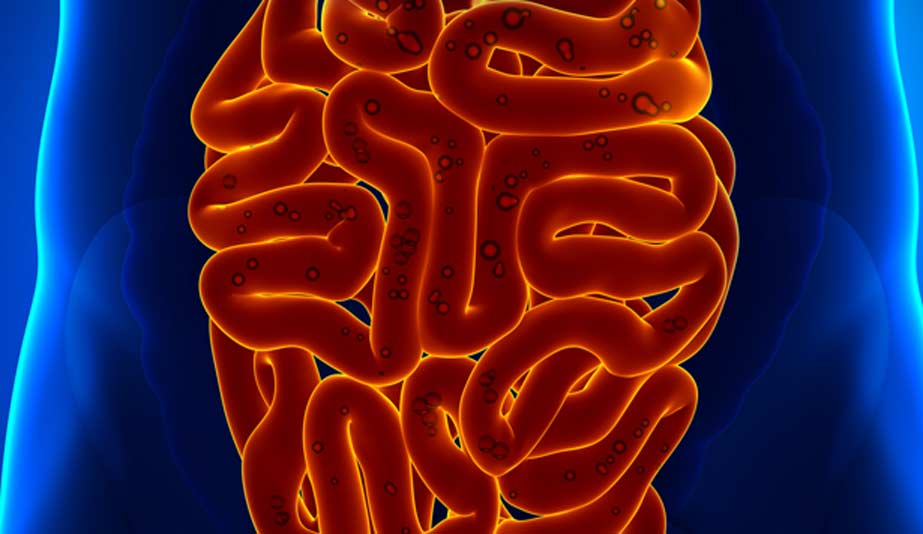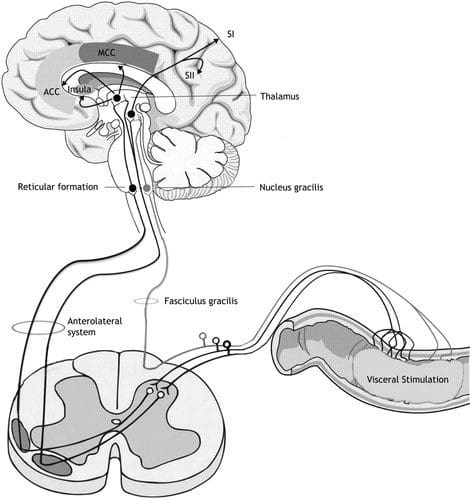Table of Contents
Introduction
The gastrointestinal or gut system helps modulate the body’s homeostasis and metabolize the immune system. With its connection to the brain, the gut can help transport the nutrients and additional information to the corresponding muscles, tissues, and organs to function. These muscles, tissues, and organs all have a job to do and help the body stay healthy from internal and external factors that can harm the gut system. When internal factors disrupt the gut system, it can lead to various symptoms affecting the gut and the internal organs and muscles surrounding the gut system. Today’s article looks at one of the gut disorders known as irritable bowel syndrome and its effect on the lumbar back, and how gut issues in the body cause visceral hypersensitivity. We refer patients to certified, skilled providers specializing in gastrointestinal and chiropractic treatments that help those suffering from gut issues like irritable bowel syndrome and back pain. We also guide our patients by referring to our associated medical providers based on their examination when it’s appropriate. We find that education is critical for asking insightful questions to our providers. Dr. Alex Jimenez DC provides this information as an educational service only. Disclaimer
Can my insurance cover it? Yes, it may. If you are uncertain, here is the link to all the insurance providers we cover. If you have any questions or concerns, please call Dr. Jimenez at 915-850-0900.
Irritable Bowel Syndrome Affecting The Body
Have you experienced chronic inflammation in your gut? Have you been feeling overly stressed and constantly affecting your gut? Has your favorite food been causing issues in your gut? Experiencing these symptoms are signs that you might have IBS or irritable bowel syndrome. Research studies have defined IBS as one of the most common diagnoses of gastrointestinal diseases. When a person starts to develop IBS in their gut system, many factors can come into play that can cause the development. IBS is usually formed when there are altercations in the intestinal walls. This causes the gut bacteria to leak out and causes the immune system to attack the intestinal wall linings. Other research studies have mentioned that inflammatory effects can cause visceral hypersensitivity to affect the body by increasing high concentrations of proinflammatory cytokines in the enteric nerves and having a high mast cell count.
Many factors like food sensitivities, bacterial overgrowth, visceral hypersensitivity, and intestinal inflammation are some of the various implications of the pathology of IBS. Research studies have found that when lifestyle changes alter the gut system, it can be associated with discomfort in the abdominal regions while affecting the biochemical integrity. Additional research studies have mentioned that when an individual suffers from IBS, the stressful impact can cause visceral pains to rise in extremities causing the surrounding organs in the gut system to become hypersensitive. IBS associated with visceral pain can also affect the pelvic region and the lower back, causing another set of issues that affect the body.
An Overview Of Abdominal Pain-Video
Have you been feeling inflammation in your gut? Does your lower back or pelvic region begin to ache or make you feel uncomfortable? Have you been experiencing IBS or other gut issues? Many of these symptoms are common in individuals with IBS and abdominal pain. The video above gives an excellent explanation of the three different problems that can affect the abdominal region of the body. Research studies have mentioned that visceral pain is a highly complex disorder that can affect a person who either haves or hasn’t had any structural changes or biochemical abnormalities affecting their gut. When a person’s gut becomes hypersensitive to visceral pain, it can affect the different afferents to arise when the lumbosacral spinal cord aggravates.
Visceral Hypersensitivity Caused By Gut Issues
When the visceral reflexes become hypersensitive, research studies have found that visceral hypersensitivity has become a clinical marker for individuals that suffer from IBS. Some of the symptoms can include:
- Frequent bowel movements
- Bloating
- Abdominal pain
Another indication of visceral hypersensitivity due to IBS is when it is nociceptive input from the colon that can lead the gut system to have hypersensitivity and this can increase the intestinal permeability that alters the gastrointestinal tissues. When this happens it can cause the blood microvessels to make the other targeted organs become hypersensitive as well. Additional research studies have found that when there is abdominal pain in the gut system it can cause other disorders like noncardiac chest pain and other conditions that can develop in the peripheral tissues in the body. When individuals begin to make small changes in their lifestyle habits, it can be beneficial to the other systems and the muscles that have been affected.
Conclusion
The gut or gastrointestinal system helps the body regulate its homeostasis and metabolize the immune system to keep the muscles and surrounding organs functional. When internal or external factors cause problems in the gut system, it can develop into IBS and be associated with visceral hypersensitivity to the corresponding organs and muscles, causing various issues that can make the body dysfunctional. The lumbosacral spinal cord and its nerves become aggravated and cause pelvic and low back pain in the lower half of the body. When this happens, a person will become miserable and affect their quality of life. By making small habit changes in relieving IBS from the gut, the rest of the body will begin to heal naturally.
References
Farmer, Adam D, and Qasim Aziz. “Gut Pain & Visceral Hypersensitivity.” British Journal of Pain, SAGE Publications, Feb. 2013, https://www.ncbi.nlm.nih.gov/pmc/articles/PMC4590155/.
Greenwood-Van Meerveld, Beverley, and Anthony C Johnson. “Stress-Induced Chronic Visceral Pain of Gastrointestinal Origin.” Frontiers in Systems Neuroscience, Frontiers Media S.A., 22 Nov. 2017, https://www.ncbi.nlm.nih.gov/pmc/articles/PMC5702626/.
Hadjivasilis, Alexandros, et al. “New Insights into Irritable Bowel Syndrome: From Pathophysiology to Treatment.” Annals of Gastroenterology, Hellenic Society of Gastroenterology, 2019, https://www.ncbi.nlm.nih.gov/pmc/articles/PMC6826071/.
Mayer, E A, and G F Gebhart. “Basic and Clinical Aspects of Visceral Hyperalgesia.” Gastroenterology, U.S. National Library of Medicine, July 1994, https://pubmed.ncbi.nlm.nih.gov/8020671/.
Patel, Nicolas, and Karen Shackelford. “Irritable Bowel Syndrome.” In: StatPearls [Internet]. Treasure Island (FL), StatPearls Publishing, 10 July 2021, https://www.ncbi.nlm.nih.gov/books/NBK534810/.
Saha, Lekha. “Irritable Bowel Syndrome: Pathogenesis, Diagnosis, Treatment, and Evidence-Based Medicine.” World Journal of Gastroenterology, Baishideng Publishing Group Inc, 14 June 2014, https://www.ncbi.nlm.nih.gov/pmc/articles/PMC4051916/.
Zhou, QiQi, and G Nicholas Verne. “New Insights into Visceral Hypersensitivity–Clinical Implications in IBS.” Nature Reviews. Gastroenterology & Hepatology, U.S. National Library of Medicine, June 2011, https://www.ncbi.nlm.nih.gov/pmc/articles/PMC3437337/.
Disclaimer
Post Disclaimer
Professional Scope of Practice *
The information on this blog site is not intended to replace a one-on-one relationship with a qualified healthcare professional or licensed physician and is not medical advice. We encourage you to make healthcare decisions based on your research and partnership with a qualified healthcare professional.
Blog Information & Scope Discussions
Welcome to El Paso's Premier Wellness and Injury Care Clinic & Wellness Blog, where Dr. Alex Jimenez, DC, FNP-C, a board-certified Family Practice Nurse Practitioner (FNP-BC) and Chiropractor (DC), presents insights on how our team is dedicated to holistic healing and personalized care. Our practice aligns with evidence-based treatment protocols inspired by integrative medicine principles, similar to those found on this site and our family practice-based chiromed.com site, focusing on restoring health naturally for patients of all ages.
Our areas of chiropractic practice include Wellness & Nutrition, Chronic Pain, Personal Injury, Auto Accident Care, Work Injuries, Back Injury, Low Back Pain, Neck Pain, Migraine Headaches, Sports Injuries, Severe Sciatica, Scoliosis, Complex Herniated Discs, Fibromyalgia, Chronic Pain, Complex Injuries, Stress Management, Functional Medicine Treatments, and in-scope care protocols.
Our information scope is limited to chiropractic, musculoskeletal, physical medicine, wellness, contributing etiological viscerosomatic disturbances within clinical presentations, associated somato-visceral reflex clinical dynamics, subluxation complexes, sensitive health issues, and functional medicine articles, topics, and discussions.
We provide and present clinical collaboration with specialists from various disciplines. Each specialist is governed by their professional scope of practice and their jurisdiction of licensure. We use functional health & wellness protocols to treat and support care for the injuries or disorders of the musculoskeletal system.
Our videos, posts, topics, subjects, and insights cover clinical matters and issues that relate to and directly or indirectly support our clinical scope of practice.*
Our office has made a reasonable effort to provide supportive citations and has identified relevant research studies that support our posts. We provide copies of supporting research studies available to regulatory boards and the public upon request.
We understand that we cover matters that require an additional explanation of how they may assist in a particular care plan or treatment protocol; therefore, to discuss the subject matter above further, please feel free to ask Dr. Alex Jimenez, DC, APRN, FNP-BC, or contact us at 915-850-0900.
We are here to help you and your family.
Blessings
Dr. Alex Jimenez DC, MSACP, APRN, FNP-BC*, CCST, IFMCP, CFMP, ATN
email: coach@elpasofunctionalmedicine.com
Licensed as a Doctor of Chiropractic (DC) in Texas & New Mexico*
Texas DC License # TX5807
New Mexico DC License # NM-DC2182
Licensed as a Registered Nurse (RN*) in Texas & Multistate
Texas RN License # 1191402
ANCC FNP-BC: Board Certified Nurse Practitioner*
Compact Status: Multi-State License: Authorized to Practice in 40 States*
Graduate with Honors: ICHS: MSN-FNP (Family Nurse Practitioner Program)
Degree Granted. Master's in Family Practice MSN Diploma (Cum Laude)
Dr. Alex Jimenez, DC, APRN, FNP-BC*, CFMP, IFMCP, ATN, CCST
My Digital Business Card




